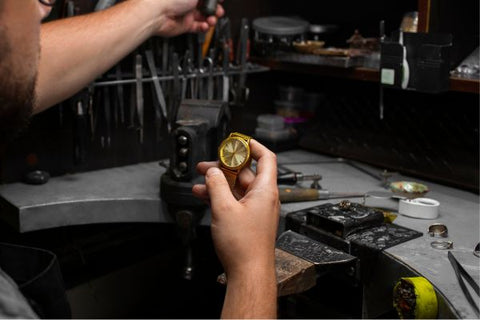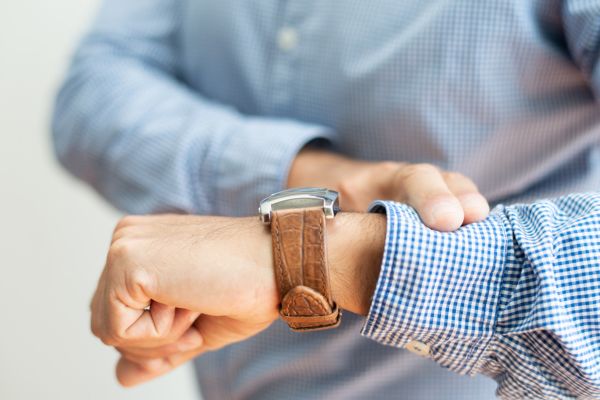Summary
- Why might an automatic watch stop?
- Common causes of automatic watch stopping
- Automatic watch that has stopped: should you be worried?
Wearing an automatic watch means choosing a lively, mechanical, and elegant timepiece. But what should you do when your automatic watch suddenly stops? Is it a defect? Should you be concerned? A stopped automatic watch doesn't necessarily mean it's damaged. In many cases, this is part of its normal functioning.
Why might an automatic watch stop?
Unlike a quartz watch, which is powered by a battery, an automatic watch operates using a mechanical mechanism that stores energy via a mainspring. This spring winds itself automatically thanks to the movements of your wrist. When the watch is not worn, or not sufficiently stressed, this spring gradually relaxes until the movement stops .
Most automatic watches have a power reserve of between 40 and 70 hours . If your Seamaster , Aquanaut or even Datejust automatic watch is left stationary for one or two days, it may naturally stop. This phenomenon is therefore common, especially if you do not wear your watch daily, or if your movements are not very dynamic .
Common causes of automatic watch stopping
There are several reasons why an automatic watch may stop working. It's not always a malfunction.
The watch is not worn or wound enough
This is the most common cause. If your automatic watch stops at night or stops while you are wearing it, it may be due to insufficient wear during the day . Contrary to popular belief, simply wearing it is not enough: you must be moving enough to activate the internal rotor.
Some people, who work sitting all day or have little physical activity, notice that Their automatic watch often stops even when it is on their wrist. This is not a sign of a breakdown, but rather insufficient mechanical stress.
The solution is simple: wear it longer, or wind it manually. Most modern models allow manual winding via the crown (usually between 20 and 40 turns, depending on the caliber).
The watch is magnetized
Another underestimated phenomenon is magnetization . Many everyday objects emit magnetic fields that can affect the proper functioning of a mechanical watch: telephones, computers, Bluetooth speakers, etc.
A magnetized watch may display various signs: excessive winding, irregular winding, or stopping for no apparent reason. Sometimes, automatic watches stop and start unpredictably.
Fortunately, the solution is simple: a quick demagnetization session at a watchmaker's or using a small, suitable device is often enough to correct the problem.
Maintenance has not been carried out for several years

Like any precision mechanism, an automatic watch requires regular maintenance. Over time, the oils that lubricate the gears can dry out, thicken, or become smeared. This leads to increased wear on components, slowing down the movement, or even stopping it completely.
It's not uncommon to hear "my automatic watch stops often," even though it hasn't been serviced since purchase. A complete service is generally recommended every 3 to 5 years , even if the watch appears to be working properly.
The Watchmaking Center also details the telltale signs of a need for servicing, such as unusual delays or frequent stops.
Mechanical failure or shock
Your automatic watch may be stopping due to a faulty part. This could be the rotor, the barrel spring, or any other component of the movement. A poorly absorbed shock, a fall, or an original anomaly can block the mechanism or desynchronize it .
In these cases, the stopped automatic watch may exhibit strange behaviors: it stops on the wrist even after being worn, or it stops immediately after being wound.
A diagnosis by a watchmaker is then essential. They will be able to determine whether it is simply a blockage or a part that needs replacing.
Automatic watch that has stopped: should you be worried?
Understanding whether your watch's stopping is benign or not depends on its behavior and history.
When stopping is normal
In most cases, an automatic watch that stops is nothing abnormal. It's often just a matter of having forgotten it on a table, or not having worn it enough. It's common for it to stop at night after a day of light activity. The same is true if you own several watches and alternate wearing them: some may remain motionless for several days.
If the watch starts normally after manual winding or a few movements of the wrist , the mechanism is working correctly.
When should you consult a professional?
On the other hand, if you notice that your automatic watch stops regularly despite daily and active wear, or if it restarts then stops again for no reason, it is prudent to have its condition checked .
Likewise, if your watch has suffered a shock, has been exposed to a strong magnetic source, or if it has not been serviced for several years, a professional check will help prevent premature wear or more serious damage.
An automatic watch is a delicate instrument with timeless charm, which lives in time with your movements. Its stopping isn't always a sign of a breakdown: more often than not, it's a natural malfunction due to a lack of movement or neglected maintenance.
Understanding why your automatic watch stops, knowing when it's normal, and identifying situations where a watchmaker needs to intervene allows you to take better care of it.


How do you choose the right watch size for your wrist?
Why choose a watch with a sapphire crystal?